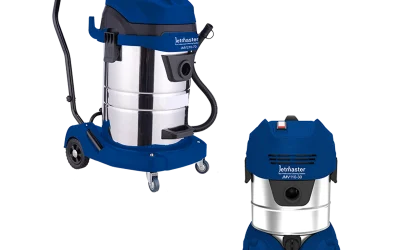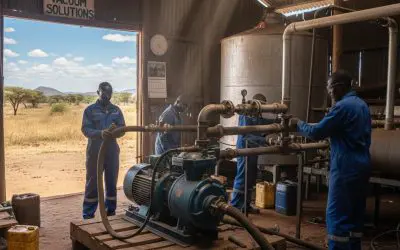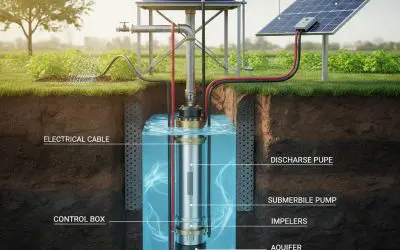
When it comes to industrial and commercial operations in Singapore, selecting the right pump is more than just a technical choice — it is a decision that affects efficiency, reliability, costs, and long-term sustainability. With so many types of pumps available, from centrifugal to positive displacement models, understanding the differences and their applications is crucial for businesses across manufacturing, water treatment, oil & gas, and construction.
At Winston Engineering, we have been supporting industries in Singapore for decades, helping clients select and maintain the most suitable pumping solutions for their needs. This guide provides a comprehensive look at the major types of pumps, their features, and their ideal applications.
1. Primary Pump Categories
Centrifugal Pumps (Dynamic Pumps)
-
Principle: Use a rotating impeller to convert kinetic energy into pressure energy.
-
Best For: High flow rates, clean or slightly contaminated fluids, and continuous operation.
-
Common Applications: Water supply, HVAC systems, chemical processing, oil refining, and power generation.
Positive Displacement Pumps
-
Principle: Move a fixed amount of fluid by mechanical displacement.
-
Best For: High pressures, viscous or shear-sensitive fluids, and accurate dosing.
-
Common Applications: Food processing, pharmaceuticals, hydraulic systems, and oil pumping.
2. Types of Centrifugal Pumps
-
End Suction Pumps – Affordable, simple design, best for general water service and HVAC.
-
Split Case Pumps – High efficiency and capacity, commonly used in water supply and fire protection.
-
Vertical Turbine Pumps – Excellent for deep wells and water intake systems.
-
Multistage Pumps – Designed for high-pressure applications such as boiler feed and reverse osmosis.
-
Self-Priming Pumps – Useful for systems with suction lift challenges.
-
Chemical Process Pumps (ANSI/ISO) – Built for chemical compatibility and corrosion resistance.
3. Types of Positive Displacement Pumps
-
Reciprocating Pumps – Includes piston, plunger, and diaphragm pumps for high-pressure or chemical applications.
-
Rotary Pumps – Gear, screw, vane, and lobe pumps for handling viscous fluids and sanitary applications.
4. Key Factors in Pump Selection
When evaluating the right pump for your operations in Singapore, consider:
-
Flow rate & pressure requirements
-
Fluid characteristics (temperature, viscosity, abrasiveness, corrosiveness)
-
Energy efficiency & operating costs
-
Maintenance needs & spare part availability
-
Total cost of ownership (TCO)
-
Supplier reliability and technical support
5. Common Mistakes to Avoid
Many companies make costly errors when selecting pumps. The most common mistakes include:
-
Ignoring specific application requirements
-
Overlooking detailed pump specifications
-
Underestimating maintenance needs
-
Neglecting energy efficiency
-
Focusing only on purchase cost instead of lifecycle costs
-
Failing to research suppliers and after-sales support
-
Rushing the decision-making process
Avoiding these pitfalls ensures your investment delivers long-term reliability and performance.
6. Why Work with Winston Engineering
As one of Singapore’s trusted pump suppliers, Winston Engineering combines technical expertise with a wide portfolio of pumping solutions. We provide:
-
A full range of types of pumps for industrial and commercial needs
-
Local stock and spare parts for minimal downtime
-
Expert consultation and system analysis
-
Preventive maintenance and servicing for long-term performance
Our team helps you balance cost, efficiency, and durability so that your operations run smoothly — whether you’re managing municipal water systems, chemical plants, or food processing facilities.
Conclusion
Understanding the types of pumps and their applications is essential for industries in Singapore that demand reliability and efficiency. By considering factors such as flow rate, pressure, fluid properties, and total cost of ownership, you can make informed decisions that save costs and reduce downtime.
At Winston Engineering, we don’t just supply pumps — we deliver solutions. Contact us at [email protected] or visit www.winstonengineering.com to discover the best pumping solution for your business.
Frequently Asked Questions (FAQs) on Types of Pumps
1. What are the main types of pumps used in Singapore industries?
The two main categories are centrifugal pumps and positive displacement pumps. Centrifugal pumps are common for water supply, HVAC, and chemical processes, while positive displacement pumps handle high pressures, viscous fluids, and precise dosing — often in food, pharmaceutical, and oil & gas applications.
2. Which type of pump is best for high-pressure applications?
Positive displacement pumps, such as plunger or piston pumps, are ideal for high-pressure duties because they deliver consistent flow even against strong resistance.
3. How do I choose the right pump for my business in Singapore?
Consider the flow rate, pressure requirements, fluid properties, energy efficiency, and long-term operating costs. Working with a trusted local supplier like Winston Engineering ensures you get expert guidance and the best fit for your system.
4. Are energy-efficient pumps available in Singapore?
Yes. Many modern pumps are designed with efficiency in mind. For example, centrifugal pumps paired with variable frequency drives (VFDs) can reduce electricity consumption and lower overall running costs.
5. Does Winston Engineering provide after-sales pump support in Singapore?
Absolutely. Winston Engineering provides technical support, preventive maintenance, and a ready stock of spare parts to keep your pumps operating reliably and cost-effectively.



